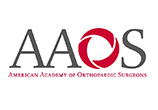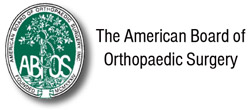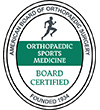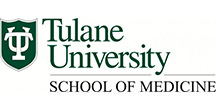What will my knee look and feel like after surgery? What is normal?
Your knee will be wrapped in a dressing beneath an ace bandage and in a post-operative brace. Your brace and knee will be locked in extension. You will have a compression stocking on your affected leg. You should wear this at all times for the first week. You should keep your leg elevated often to reduce swelling. You may place a pillow under your foot/ ankle when elevating - not under your knee. Pump your ankle several times per hour to keep blood circulating in your leg. You may see some dried blood or clear fluid in your dressing, this is to be expected after surgery. There may be some black-and-blue markings around your incisions. These sometimes develop a few days after surgery. It is normal to feel swelling and discomfort in your knee for a few days to weeks after your surgery.
What medications have I been prescribed?
You will be instructed to use Ibuprofen (Motrin, Advil) and Acetaminophen (Tylenol) regularly for post-operative pain management. You can take up to 800mg of Ibuprofen three times a day. We recommend you take it with breakfast, lunch and dinner and do not take it on an empty stomach. You can alternate 650mg Acetaminophen (Tylenol extra strength) with the ibuprofen as needed.
You have also been provided a narcotic medication for pain, please take as prescribed. This is to be taken only as needed for pain. We recommend taking it at night/before bedtime and you should decrease the amount you take as the pain improves. Drink plenty of water and use the prescribed stool softener if you are using regularly, as the narcotic can cause constipation. Do not drive, drink alcohol, or operate machinery/ appliances while taking this medication. Narcotic medication can be highly addictive, please only take as needed and contact the office with any concerns
You may also be prescribed aspirin daily for 2 weeks after your surgery, unless you have a history of stomach ulcers, bleeding disorders, or allergies to aspirin. Do not take aspirin if you are already on blood thinners (Lovenox or Coumadin).
Should I be icing my knee?
You may use ice bags or cryotherapy device to help control pain and swelling in your knee. We recommend you ice for 30 minutes every hour or two. This is most important the first few days following surgery. Do not apply ice, directly to skin. Make sure you use a towel or t-shirt between ice and your skin for protection.
When can I remove my dressing? When can I shower?
We ask that you keep the dressing clean, dry, and intact for 3 days after surgery. After this time, you may remove the dressing and shower. You will notice thin white strips covering each of your incisions, these are steri-strips. Please, leave these on until your first post-operative appointment. They may fall off on their own, this is okay. You may come out of your brace to shower, assistance may be required to protect from falls. You may allow water to run over your incisions. After, pat dry and cover each incision with band-aids. Do not soak your incisions (hot tub, bath, etc.). Do not put any ointments on your incisions.
When can I start moving my leg?
You are to have your brace locked in extension when ambulating and sleeping for the first 6 weeks. Use crutches as needed. You may discontinue the crutches once you are comfortable without them. The brace should be on, locked in extension at all times. You mat weight-bear as tolerated with the brace. You will begin physical therapy after your first post-operative appointment.
When are my follow-up appointments? What happens at each visit? What’s the rehab timeline?
After your surgery you will have follow-up appointments around 2 weeks, 6 weeks, and 3 months post-op. You will begin physical therapy after two weeks. You will remain in your brace for the first 6 weeks. It takes 3 months for your ACL to heal and 8+ months to complete rehab from ACL surgery.





